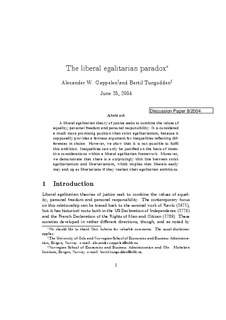| dc.contributor.author | Cappelen, Alexander W. | |
| dc.contributor.author | Tungodden, Bertil | |
| dc.date.accessioned | 2006-08-03T07:14:06Z | |
| dc.date.available | 2006-08-03T07:14:06Z | |
| dc.date.issued | 2004-06 | |
| dc.identifier.issn | 0804-6824 | |
| dc.identifier.uri | http://hdl.handle.net/11250/162890 | |
| dc.description.abstract | A liberal egalitarian theory of justice seeks to combine the values of
equality, personal freedom and personal responsibility. It is considered
a much more promising position than strict egalitarianism, because it
supposedly provides a fairness argument for inequalities reflecting differences
in choice. However, we show that it is not possible to fulfil
this ambition. Inequalities can only be justified on the basis of incentive
considerations within a liberal egalitarian framework. Moreover,
we demonstrate that there is a surprisingly thin line between strict
egalitarianism and libertarianism, which implies that liberals easily
may end up as libertarians if they weaken their egalitarian ambitions. | en |
| dc.format.extent | 168395 bytes | |
| dc.format.mimetype | application/pdf | |
| dc.language.iso | eng | en |
| dc.publisher | Norwegian School of Economics and Business Administration. Department of Economics | en |
| dc.relation.ispartofseries | Discussion paper | en |
| dc.relation.ispartofseries | 2004:8 | en |
| dc.title | The liberal egalitarian paradox | en |
| dc.type | Working paper | en |
